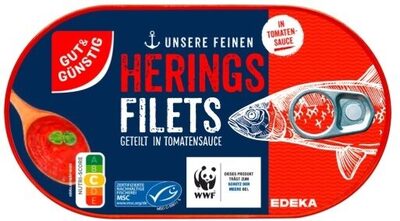
Barcode: 4311596439478
Heringsfilets in Tomatensauce
DOUBTFUL
📝 Reason: The product contains Branntweinessig, which is vinegar derived from alcohol. Some Islamic schools of thought consider this doubtful due to its alcohol origin, hence the product is marked as Doubtful. Other ingredients are generally considered Halal. For more detailed rulings, consult Islamic dietary laws or a Halal certification body.
📄 Certificates: None
Ingredients:
Details
Understanding the Halal Status of Heringsfilets in Tomatensauce
If you’re curious about the Halal status of Heringsfilets in Tomatensauce, you’re not alone. Many consumers are interested in determining whether their food meets Islamic dietary laws. In the case of this product, its Halal status is considered ‘Doubtful’ due to one ingredient: Branntweinessig, which is vinegar derived from alcohol. However, the other ingredients in this dish are generally accepted as Halal.
Ingredients Breakdown
Let’s examine each ingredient to better understand their status under Islamic dietary laws:
- Heringsfilets: Herring is a fish that is generally considered Halal as per Islamic teachings.
- Wasser: Water is always Halal.
- Tomatensauce: Tomato sauce is typically Halal and used widely in various dishes.
- Rapsöl: Rapeseed oil is also deemed Halal.
- Zucker: Sugar is universally accepted as Halal.
- Speisesalz: Table salt remains Halal.
- Senf: Mustard is Halal.
- Senfsaaten: Mustard seeds are Halal.
- Branntweinessig: This vinegar derived from alcohol presents the primary concern due to differing opinions among Islamic scholars regarding its Halal status. Some schools of thought find it permissible, while others consider it doubtful.
- Gewürze: The spices included are generally Halal.
- Mangofruchtfleisch: Mango pulp is Halal.
- modifizierte Stärke: Modified starch is typically Halal.
- Guarkernmehl (E412): Guar gum is accepted as Halal.
- Johannisbrotkernmehl (E410): Carob gum is also Halal.
Why is this product marked as Doubtful?
The primary reason for the ‘Doubtful’ status relates to Branntweinessig, which is derived from alcohol. The presence of alcohol in food products can render them unacceptable in the eyes of many Muslims who adhere strictly to Halal dietary rules. While some Islamic scholars may argue that the fermentation process eliminates the intoxicating effects of alcohol, others remain cautious. Therefore, the product’s status falls into a gray area.
Conclusion
In summary, Heringsfilets in Tomatensauce is a product with predominantly Halal ingredients, except for Branntweinessig. Its Halal status, deemed as ‘Doubtful,’ should be critically assessed by consumers who are strict about adhering to Islamic dietary guidelines. If you are unsure, consult Islamic dietary laws or reach out to a Halal certification body for further clarification. Always prioritize your beliefs when making dietary choices.

